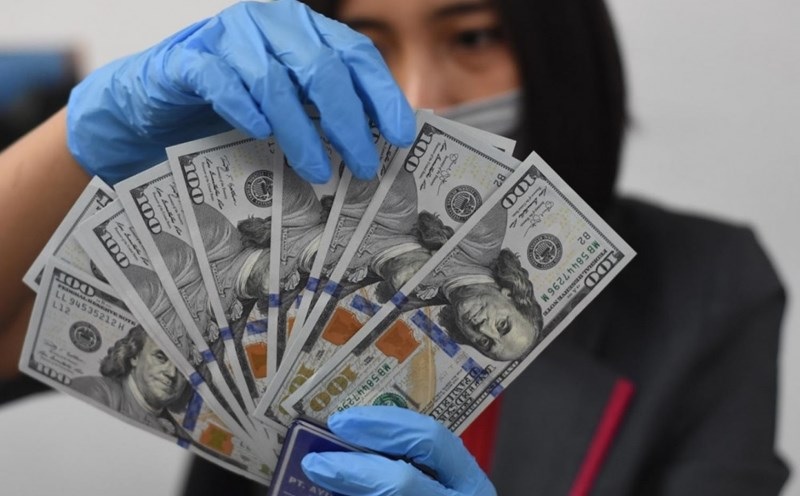The SBV drains money, but exchange rates stay on the rise
According to Mr. Nguyen Minh Tuan, CEO of AFA Capital, the State Bank's drainage of tens of hundreds of billion VND through the bond channel is still minimal in comparison to previous years. Simultaneously, the objective of raising interbank market interest rates while minimizing exchange rate pressure will be ineffective.
Not meeting the target
From September 21 to 26, the State Bank of Vietnam (SBV) restarted bond issuance in the open market after a 6-month hiatus, with a total outflow of up to 50,000 billion VND for a 28-day period (which is still ongoing in the final two sessions).
Bond winning interest rates are now higher than average interbank interest rates. Analysts anticipate that SBV's VND draining action will raise interbank market interest rates marginally and lessen future exchange rate pressure.
We've recently talked a lot about Federal Reserve (Fed) meetings concerning interest rates, and with the narrative of SBV's bond drainage, many people recognize that monetary policy is ready to shift from lax to tight. As a result, experts believe it is critical to appropriately examine this issue.
There are two components to monetary policy: the quantity of money moving throughout the economy via the money supply, and, most crucially, credit expansion. The second component is the interest rates that impact the interbank market, as well as the Central Bank.
Bonds are therefore a relatively tiny role, and draining bonds is done to manage the interbank market and the Central Bank, not as part of the overall monetary policy of the economy. The SBV has not changed its monetary policy at this time. Looking deeper, the overall credit growth rate for the economy until September 2023 is less than 6%, showing that there is still a lot of money in the banking sector.
The USD exchange rate of the SBV - buying and selling, as well as the USD exchange rate of commercial banks and the free USD exchange rate, are now growing. According to Mr. Tuan, Vietnam must tolerate an exchange rate increase of 4 to 5% this year.
Because the interbank market's interest rate differential is only about 1 - 2% and the USD interest rate is about 5%, this suggests that the interbank market is holding a lot of USD, exerting pressure on the exchange rate. The Central Bank should remove money from this market to relieve pressure.

The SBV has drained approximately 50,000 billion VND in four straight sessions, as can be observed from the recent ongoing actions. In comparison to March 2023, when we drained over 200,000 billion VND, this amount is only 14, and at other times it is around 120,000 billion VND.
According to Mr. Tuan, the real amount drained in the interbank market in comparison to prior is little. Simultaneously, the objective of raising interbank market interest rates while minimizing exchange rate pressure will be ineffective.
Cautious psychology
However, for stock market investors, this knowledge has a significant impact on investor psychology. According to some, the stock market is reacting unfavorably to reports of bond drainage, and the VN-Index has plummeted considerably. Meanwhile, the Central Bank's pumping and draining of money is a normal occurrence, and Vietnam will emphasize GDP development this year. So we must concentrate on GDP growth in the third quarter.
Individual investors, on the other hand, must be aware of market risks in the face of varied information flows. There has been a lot of information from foreign and domestic sources in the last month, such as the US's "hawkish" strategy with extended high-interest rates, as well as another interest rate rise, which is a new danger point. This danger will not be understood until the Federal Open Market Committee (FOMC) meets.
Due to the high USD deposit interest rates in such an environment, capital flows are focused on the US market, driving investors to sell assets in low-interest-rate locations to focus on high-interest financial assets, resulting to an increase in the value of the USD.
In the Vietnamese market, non-market information such as the operation of KRX, the regulation requiring the cleaning of stock transaction data, or bond drainage information, combined with the exchange rate issue that has been raised frequently since the beginning of the year, has a negative psychological impact on investors. The latest stock market adjustment has reflected the market's dangers. What we must remember is that, while monetary policy has not changed, we must consider the psychology of investors, from F0 to professional, who are willing to abandon the market in order to return at a more appealing price.
Furthermore, we must watch how the market evolves in the future because there will be many risks, including international issues such as the US dollar index rising to 106, the story of the US government's public debt; while domestically, we must watch the exchange rate, GDP figures for the third quarter - a focal point to see if monetary policy will change. At the same time, the conclusion of the third quarter is the time for businesses, particularly publicly traded ones, to report their financial performance...








